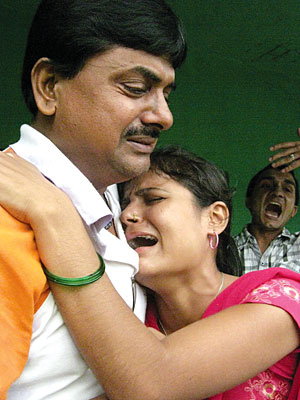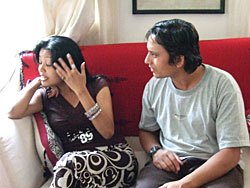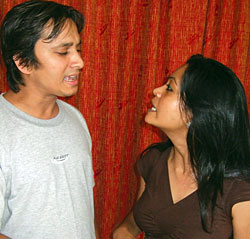 Dowry Stress: Rakesh, played by Madan Thakur, and his daughter, Manika, played by Rina Yadav |
I know of women in the UK who pretend to be less successful, less clever, less happy than they are just to make their menfolk feel better. I know of professional women in Nepal who change personality in front of their parents-in-law. There are others who refuse to play that game. What happens then? Listen to the BBC's Katha Mitho Sarangiko radio series to find out.
Binita lives in Kathmandu. She's westernised, educated, intellectually hungry. She defies tradition, marries out of her ethnic group, and wants to write the greatest thesis on Gandharba music known to mankind. Compare her story with Manika's. She lives in the Tarai. She has no love interest. She has more modest aims: she wants to study beyond SLC and stay with her widowed father. She bows to tradition when the pressure to marry her off builds up.
Binita's father is dead, she has no brothers, and although her mother grumbles at her behaviour, she lets Binita have her way. Binita has the choices of a modern urban woman, but these choices are not easy to manage. Her privileged lifestyle buys privacy; privacy leads to pre-marital sex with her boyfriend, Ashish, and an unplanned pregnancy.
This being modern, urban Kathamandu, love wins through and they get married. It's not long, however, before Ashish is under pressure from his large and dominating family to produce a boy. Alas for Binita, she gives birth to a daughter. When she gets pregnant again, Ashish suggests a scan to find out the sex of the baby. 'We can always try again if it's a girl,' he says softly, and Binita realises he sees abortion as a possibility.
 Tension: Binita, played by Shivani Singh Tharu who also wrote the story, with Khagendra Lamichhane as Ashish. |
Her world collapses around her. From being a serious student of folk music, she now feels reduced to a boy baby-producing machine. But she doesn't take it lying down. She complains, she protests, she stops being a compliant wife. Small domestic issues become the focus for bitter recriminations. The marriage becomes toxic, and when Ashish turns to drink and forces himself drunkenly on Binita one night, she retaliates with accusations of marital rape. The marriage has reached rock bottom.
Shivani Singh Tharu's story is a serious investigation into how marriage can be caught in the vice of modernity and tradition. The resolution, for Binita and Ashish, requires the latter to reinvent tradition, and delink his sense of status from needing a son. Just as important, he realises how much her academic work outside the marriage is a key to her happiness within the marriage.
As for Manika, she has none of the privileges of a modern woman, living as she does in a small farming community in the Tarai. All she has is the very tender affection of her widower father, Rakesh. With no son, and a daughter who should already be married, he is a fragile outsider in the community.
 ANGER: Binita and Ashish work things out |
Rakesh tries to delay Manika's marriage, and rejects the approaches of a well-off father with a hooligan son who is infatuated with Manika. But father and daughter become the victim of the son's campaign of harassment. Fearful that he cannot protect his daughter on his own, he finally gives Manika in marriage to another family with a heavy heart.
Manika, who agrees to the marriage out of love for her father, finds her husband empty-headed and dull. Her mother-in-law launches pitiless tirades against her for bringing a small dowry. Isolated and miserable, Manika imagines â�" wrongly as it happens â�" that her parents-in-law want to kill her. Here, too, the resolution lies with changing the thinking of her husband and his family. This is achieved by linking the self-interest of the parents-in-law to Manika's well-being.
Men may behave badly, it's true, but they are also victims. I like to think that a third role lies before them for the taking: as pioneers of change, weaving a new pattern of behaviour in the social tapestry that pleases their wives, their daughters, their sisters, their daughters-in-law, and themselves.
READ ALSO:
Who owns a woman's body?, FIONA LEDGER
Drama in real life, KUNDA DIXIT


